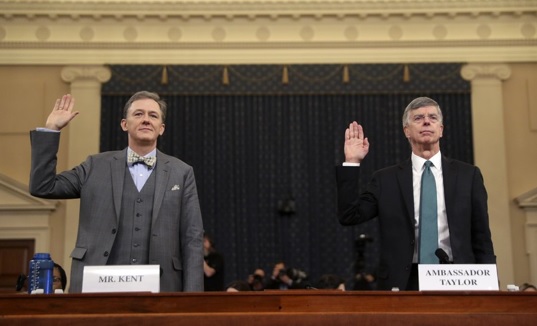Impeachment inquiries: Overview and background

William Taylor, U.S. ambassador to Ukraine (right), and George Kent, assistant in Eurasian affairs (left), testify in the first impeachment hearings held on November 13, 2019. Their testimonies and the testimonies of other U.S. officials were used in drafting the president’s articles of impeachment. Photo courtesy of the Salt Lake Tribune.
December 16, 2019
The question of impeachment has hung like a heavy, unavoidable shadow over the American political landscape ever since the news of the whistleblower complaint broke in mid-September.
Very few Americans have remained unopinionated on the issue of impeaching and possibly removing President Trump from office.
According to a poll by NBC News and the Wall Street Journal, 49% of Americans support the impeachment and removal of President Trump — almost the majority of Americans.
Talk of impeaching Trump has existed ever since he took office in 2016, but the talk has recently become action as several of Trump’s associates have been called into congressional hearings.
The hearings are focused around a phone call that took place between Trump and newly-elected Ukrainian president Volodymyr Zelensky on July 25, 2019.
An anonymous whistleblower — meaning a person who informs others of illegal activity occurring within an organization — within the government who overheard the call filed a report stating that Trump made several concerning remarks on that phone call with Zelensky.
The whistleblower’s report prompted investigation into Trump and the Ukraine; ultimately, Trump has now been suspected of actively allowing a foreign nation to influence domestic elections, specifically the 2020 presidential election.
This is because Trump asked the Ukraine to investigate the son of prominent Democratic presidential candidate Joe Biden.
Hunter Biden had been a member of the board of a Ukrainian energy company while his father was the vice president under former President Barack Obama, and Trump was interested to see if any corruption was involved in securing Hunter Biden that position.
However, Trump did more than merely ask Ukraine to investigate Biden; he withheld giving military aid to the Ukraine until Zelensky agreed to investigate the Bidens.
This deal has commonly been referred to as a quid pro quo, which essentially means “a favor for a favor.”
However, this deal that took place between Trump and Zelensky is illicit and tantamount to bribery, which is an impeachable offense as listed in the U.S. Constitution.
The quid pro quo was most likely an attempt by Trump to use foreign influence to undermine Joe Biden, a strong contender to the presidency and a threat to Trump’s chances of reelection in 2020.
Trump has referred to the entire impeachment process as a “witch hunt” at his expense, and his supporters claim that Democrats may be needlessly instigating partisan fighting right before the 2020 election.
David Chavez, U.S. history and government teacher at Loretto Academy, said, “I think it’s a little bit of both.
“Obviously what he did isn’t something you would want the president — especially of the United States — to do, but at the same time I think it’s a mistake to focus all of our attention on this issue, especially so close to the election.”
According to ABC News, Speaker of the House Nancy Pelosi announced the formal beginning of the impeachment inquiries on September 24, and the full House of Representatives voted on October 31 to authorize the inquiries and begin the congressional hearings.
According to NPR, the House Judiciary Committee had called the following officials into the first week of congressional hearings: William Taylor, U.S. ambassador to Ukraine; George Kent, an assistant in Eurasian affairs; and Marie Yovanovitch, former U.S. ambassador to Ukraine.
President Trump and several other of his associates have also been called to participate in the hearings, but so far they have refused to testify, which has slowed down the impeachment process.
Chavez said, “Legally speaking, they are allowed to refuse; for example, when you are accused of a crime, you don’t have to testify against yourself.
“However, being in the positions that they are, [testifying] is something I wish they would do, whether they’re innocent or guilty.”
The final week of November concluded the congressional hearings; afterwards came a report from the House as a summary of the proceedings and as a next step in the impeachment process.
The House Judiciary Committee has drafted two articles of impeachment against Trump that, as of December 12, are currently being voted upon and amended.
The two articles of impeachment are abuse of power and obstruction of Congress.
On December 5, Trump tweeted his response to the progression of the impeachment process in Congress:
“If you are going to impeach me, do it now, fast.”
His words summarize the anticipation that all Americans are feeling as they keep their eyes on the headlines.











